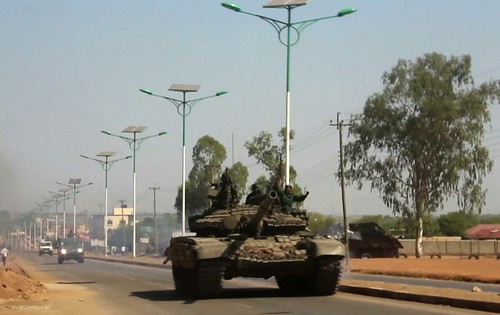
South Sudan tank during attempted coup on December 17, 2013. Reports indicate that more than 500 have been killed., a photo by Pan-African News Wire File Photos on Flickr.
February 05, 2014
ICC Could Investigate South Sudan Conflict after UN Resolution
by Peter Clottey
VOA
The International Criminal Court (ICC) cannot launch an investigation into alleged human rights violations in South Sudan despite concerns that warring factions in Africa’s newest nation are committing crimes against humanity, says Fadi El-Abdallah, spokesman for the ICC.
United Nations Secretary General Ban Ki-Moon has called for the prosecution of perpetrators of human rights violations in South Sudan, and some observers are calling for the ICC to investigate and prosecute the perpetrators.
But, El-Abdallah says the ICC can only investigate the alleged human rights violations if the UN Security Council passes a resolution authorizing the Hague-based court to begin an inquiry into the South Sudan conflict.
“In principle, the ICC has no jurisdiction and cannot investigate what is happening in South Sudan, unless there would be a request by the Security Council under chapter seven, which then would put an obligation on South Sudan to cooperate with the ICC and then the ICC can investigate,” said El-Abdallah.”
Over 1,000 people are feared dead and hundreds of thousands have been displaced from their homes due to the conflict, prompting calls for an investigation.
But, El-Abdallah says the court will be violating South Sudan’s sovereignty if it launches an investigation into the conflict, since the country has yet to officially become a signatory to the Rome Statute that established the ICC.
The ICC, he says, can only investigate human rights violations in countries that accept the jurisdiction of the court in instances where the Security Council does not pass a resolution authorizing an inquiry.
“The only way for the ICC to be able to investigate without violating the sovereignty of a state would be by a resolution from the Security Council like in the case concerning Darfur in Sudan, and Libya,” said El-Abdallah.
But some observers contend that calls by both Ban Ki-Moon and human rights groups demanding an inquiry into the rights violations should be enough to pave way for the court to begin investigations. El-Abdallah disagreed.
“For the time being we don’t have jurisdiction over South Sudan, and we will not have it unless South Sudan accepts our jurisdiction or if the United Nations Security Council [passes] a resolution putting an obligation on South Sudan to cooperate with the ICC,” said El-Abdallah.
The court, he says, has called on South Sudan to ratify the Rome Statute to help protect citizens who have become victims of the conflict.
“The ICC calls on South Sudan and all the states in the world to accept and ratify the ICC Rome Statute, to offer the ICC a universal jurisdiction and the possibility to apply the legal rules and to protect victims in all the states,” said El-Abdallah.
http://www.voanews.com/content/icc-could-investigate-south-sudan-conflict-after-un-resolution/1845325.html
February 05, 2014
South Sudan Opposition Accuses Army of New Ceasefire Violation
Opposition forces in South Sudan accused the government of violating the cessation of hostilities agreement signed less than two weeks ago with an attack Wednesday on a rebel-held position near Malakal.
"Once again, the government forces and their militias attacked our positions today in the morning at a place called Ashab al Nil and Jonglei Canal," Lual Koang, a spokesman for the opposition forces that have been fighting troops loyal to President Salva Kiir since mid-December, said.
Koang said opposition forces were able to repel the attack by SPLA soldiers, and fighters under the command of Johnson Olony, a former militia leader who was integrated into the national army last year.
Koang also said Wednesday that a large number of soldiers have defected from the SPLA and sided with the rebels.
But government spokesman Michael Makuei said "only a few" SPLA soldiers -- all from the same ethnic group as former vice president Riek Machar, who recently announced that he has formed a resistance movement against Kiir -- had gone over to the rebel side. Makuei also denied that the SPLA was involved in the attack near Malakal.
‘’We have not been attacking any positions of the rebels," he told VOA, insisting that the government is abiding by the terms of the cessation of hostilities agreement signed by the two sides in Addis Ababa on Jan. 23.
"We, as a government, are bound by and respect and conform to the cessation of hostilities. We have not attacked any positions," he said, laying the blame for the violation of the Addis Ababa agreement with the rebels.
"We have been on record saying that the rebels have been consistently attacking our forces wherever they are," Makuei said.
"The rebels have no presence south of Malakal... They are the ones attacking our forces," he said.
It was impossible to confirm the claims of either side with independent sources.
The accusation marks the second time this week that the opposition has accused the government of violating the ceasefire agreement.
On Monday, Koang said government forces, together with rebels from Sudan, attacked Leer town over the weekend and killed civilians as they tried to flee the fighting.
Leer is the hometown in Unity state of Machar, who has been accused by Kiir of triggering weeks of violence in the country by trying to oust him in what the government says was a coup bid on Dec. 15. Machar has denied the charge.
The two sides in the conflict in South Sudan are due to resume talks to hammer out a lasting peace on Feb. 7.
http://www.voanews.com/content/south-sudan-rebels-accuse-army-new-attacks-ceasefire-violation/1845196.html
No comments:
Post a Comment